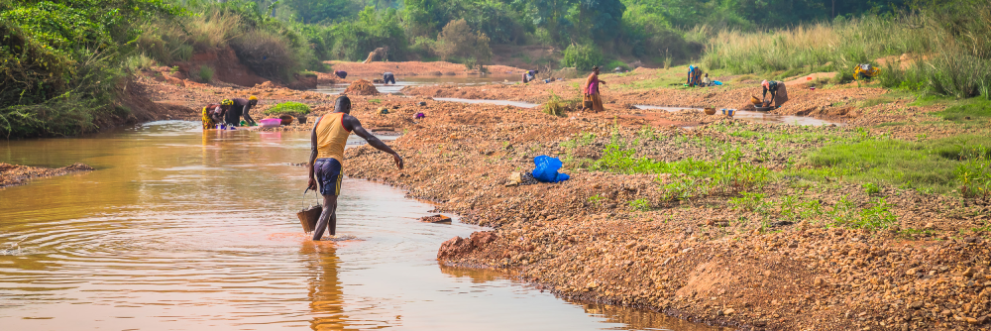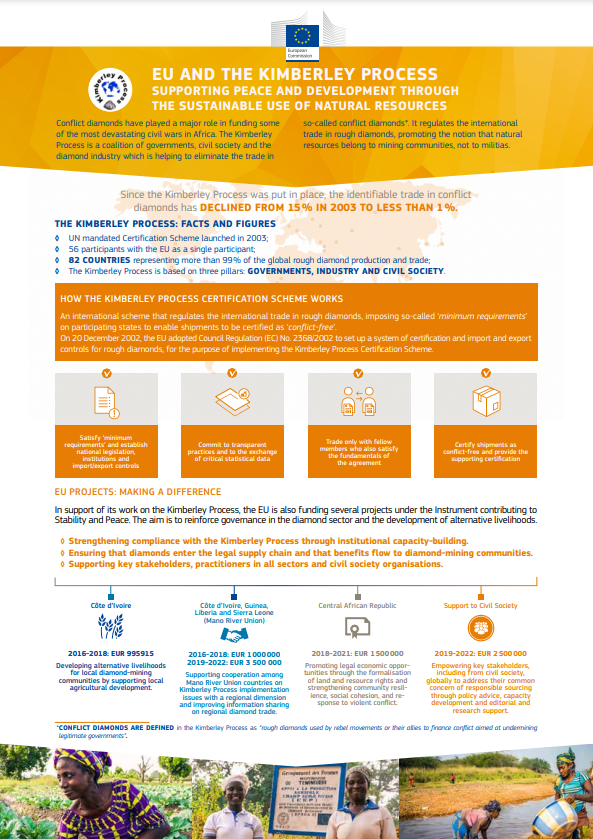
The European Union is a major centre for diamond trade. Within the EU, Council Regulation (EC) No 2368/2002, as amended, sets out the criteria for importing or exporting rough diamonds in order to ensure adherence to the requirements of the ‘Kimberley Process’ (KP).
Key facts:
- UN mandated Certification Scheme launched in 2003;
- 59 participants with the EU as a single participant;
- 85 countries representing more than 99% of the global rough diamond production and trade;
- Tripartite structure of governments, industry and civil society.
Launched in 2003, the Kimberley Process is a coalition of governments, civil society and the diamond industry to eliminate the trade in so-called conflict diamonds. Conflict diamonds are defined by the relevant United Nations Security Council resolution (United Nations Security Council resolution 1459) as “rough diamonds used by rebel movements or their allies to finance conflict aimed at undermining legitimate governments”.
Based on a mandate from the United Nations, the Kimberley Process regulates the international trade in rough diamonds. Participants in the scheme are required to:
- Satisfy ‘minimum requirements’ and establish national legislation, institutions and import/export controls;
- Commit to transparent practices and to the exchange of critical statistical data;
- Trade only with other participants in the Scheme;
- Certify shipments as conflict-free.
Today, the Kimberley Process (KP) has 59 participants, representing 85 countries (with the EU as a single participant) which account for more than 99% of the global rough diamond production and trade. The KP meets twice a year at the Intersessional and Plenary meetings. It is chaired by a participating country on an annual, rotating basis. As a consensus-based body, the KP relies on the constructive engagement from all participants of the tripartite structure.
The EU in the Kimberley Process
The European Union (EU) is a major centre for diamond trade and it has been at the forefront of the Kimberley Process since the very beginning. The EU and its 27 Member States count as a single Participant in the Kimberley Process Certification Scheme, and Council Regulation (EC) 2368/2002 implementing the Kimberley Process certification scheme for the international trade in rough diamonds applies common rules in all Member States. Any import or export of rough diamonds into/from the EU can only be done through one of the seven Union authorities:
- Antwerp (Belgium)
- Prague (Czech Republic)
- Idar-Oberstein (Germany)
- Dublin (Ireland)
- Torino (Italy)
- Lisbon (Portugal)
- Bucharest (Romania)
The EU first held the KP Chairmanship in 2007 and again in 2018. The 2018 EU Chairmanship delivered tangible progress on all of its priorities for the KP, i.e. ensuring that the process remains fit for purpose through reform, by reinforcing its unique tripartite structure, strengthening its implementation and effectiveness, and focusing on human conditions in mining as well as the prosperity of producing communities.
In support of its work on the KP, the EU is also funding several projects in Cote d’Ivoire, Guinea, Liberia, Sierra Leone and Central African Republic under the Instrument contributing to Stability and Peace. The aim is to reinforce governance in the diamond sector and the development of alternative livelihoods.
The role of the Service for Foreign Policy Instruments
- through FPI, the European Commission represents the EU in the Kimberley Process, and is advised by the EU KP Committee (made up of representatives from the 27 Member States);
- coordinates and monitors the implementation of KP rules within the EU;
- contributes to policy making on the link between natural resources and conflict.

